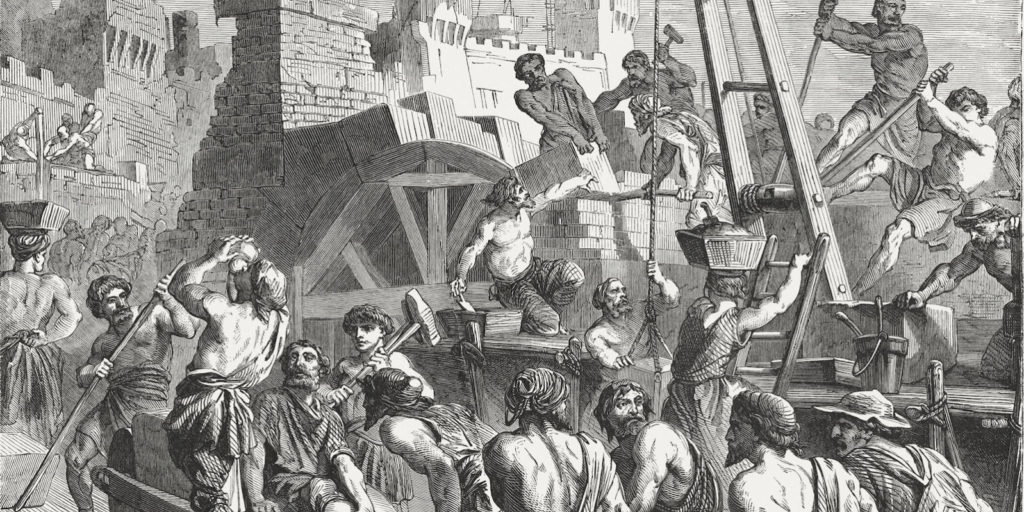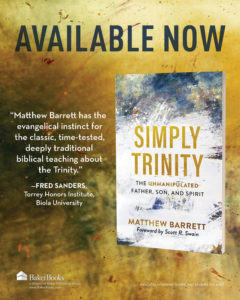
Reading Ezra-Nehemiah Theologically
T he book of Ezra-Nehemiah—books in the Protestant canon but only one book in the Hebrew Bible—tell the story of the Jewish people’s return to the promised land. More specifically, it tells the story of God fulfilling his promise “through Jeremiah” (Ezra 1:1) to restore his people to the land. They have lived through the horrors of the Babylonian exile, when Babylon marched upon Jerusalem, razed the city and its temple, and captured all but the very destitute of God’s people. Now, some seventy years later, God has stirred the heart of a foreign king, Cyrus, to send his people back home.
he book of Ezra-Nehemiah—books in the Protestant canon but only one book in the Hebrew Bible—tell the story of the Jewish people’s return to the promised land. More specifically, it tells the story of God fulfilling his promise “through Jeremiah” (Ezra 1:1) to restore his people to the land. They have lived through the horrors of the Babylonian exile, when Babylon marched upon Jerusalem, razed the city and its temple, and captured all but the very destitute of God’s people. Now, some seventy years later, God has stirred the heart of a foreign king, Cyrus, to send his people back home.
The journey from exile to restored temple and rebuilt city walls—an essential defensive feature of ancient cities—is neither quick nor easy, and the story introduces readers to a dizzying number of ancient rulers (not always in chronological order—here’s a timeline to help sort it out) and other characters with hard-to-pronounce names and backstories that Ezra-Nehemiah is not compelled to relay.
Ezra-Nehemiah is a lot like an austereogram. The details are more important than in “magic-eye pictures,” but for the purposes of this discussion of reading Ezra-Nehemiah theologically, it is helpful to set aside all the confusion over names and dates and other muddling details—especially for readers like us, who are centuries removed from these events. If we can bracket those out for the moment (these issues are addressed well in commentaries and scholarly literature), then we can see the theological significance of God’s sovereignty, worship, justice for the least of these, community building, and Scripture in Ezra-Nehemiah. Whereas God remains hidden in Esther, in Ezra-Nehemiah he is anything but. Rather, we see God overtly directing kings for his own glory and the good of his people. Click To Tweet
God’s Sovereignty
From the start of the book God’s sovereignty takes center stage. It is his word that is fulfilled and it is he who “roused the spirit of King Cyrus” (Ezra 1:1) to send home the exiled Jews. His “gracious hand” guided and protected Nehemiah (Neh 2:8), and he “put it into the king’s mind to glorify the house of the Lord in Jerusalem” and gave Ezra favor with the rulers of Persia (Ezra 7:17–28). Whereas God remains hidden in Esther, in Ezra-Nehemiah he is anything but. Rather, we see God overtly directing kings for his own glory and the good of his people. There can be no mistaking his sovereignty in this book as he leads his people in righting the wrongs that caused their exile nearly a century ago.
Worship
Second, this book is supremely concerned with the right worship of God, which is clear from the Cyrus’s declaration to Ezra: “The Lord . . . has appointed me to build a temple for him at Jerusalem in Judah” (Ezra 1:2 NIV). Temple worship provides the impetus for people from the clans of Judah and Levi to return to Jerusalem, and the long list of names in chapter 2 highlights priests, Levites, musicians, gatekeepers, and temple servants. The God of Israel had long ago established how he should be worshiped—at his temple in Jerusalem—and now his people are returning to make sure that can happen again after the destruction of the temple roughly fifty years earlier.
Justice
The most important theological contribution Ezra-Nehemiah makes to our cultural context is its vision of the all-encompassingness of walking with God. Click To Tweet Wrapped up in loving God (i.e., right worship) is loving others (i.e., doing justice). This theme comes to the fore in Nehemiah 5, where we learn that the “nobles and officials” (Neh 5:7) exploited their impoverished brothers and sisters. Rather than lending without interest to help provide for the poor among them (see Deut 23:19), the wealthy people are both charging interest and confiscating “fields, vineyards, olive groves and houses” (Neh 5:11) from the people who could not afford to pay “the king’s tax” (Neh 5:4). Nehemiah rebukes the nobles and officials, even proclaiming a curse on those who would continue to exploit their brothers and sisters (Neh 5:12).
A similar issue arises in the last chapter of Nehemiah, which more clearly shows the relationship between loving God and loving others. In this case, the newly returned exiles had stopped giving tithes, which meant that those who cared for the temple and officiated worship were forced to work the fields to care for their families. This, of course, negated the very reason for the return to the promised land.
Scripture
At the heart of each of the previous theological foci is Scripture. Ezra returns to reestablish temple worship, which was proclaimed first in Scripture. Nehemiah returns to provide safety and security to God’s people by rebuilding the wall of Jerusalem and securing its borders, a concern we see throughout the prophetic books and the Torah. Ezra reads aloud from the Torah, “making it clear and giving the meaning so that the people understood what was being read” (Neh 8:8).
Intermarriage with people outside of the covenant community, Sabbath keeping, proper treatment of the poor, repentance of sin, reminders of God’s faithfulness, providing for the Levites and temple personnel—all of those concerns are rooted in and developed from Scripture. Indeed, the exile happened in the first place because God’s people refused to be faithful to God’s self-revelation in Scripture — summarized by Jesus as loving God and loving neighbor. For Ezra and Nehemiah, then, a return to Scripture was imminently and supremely important.
Everything Matters
God is concerned about all aspects of life; there is no sacred-secular divide, no distinction between religious devotion and the rest of life. Click To Tweet Much more could be said about each of these theological themes—and more themes could be added on top of these. But I think the most important theological contribution Ezra-Nehemiah makes to our cultural context is its vision of the all-encompassingness of walking with God. These books show that every aspect of life is governed by the sovereign God. And this God is concerned about all aspects of life; there is no sacred-secular divide, no distinction between religious devotion and the rest of life—food, sex, work, worship, parenting, sorrow, joy, and everything else we do and experience in this life and the next comes under the sovereign purview of our almighty, faithful, fierce, loving Father. And, really, is that not the message of the entire Bible?

